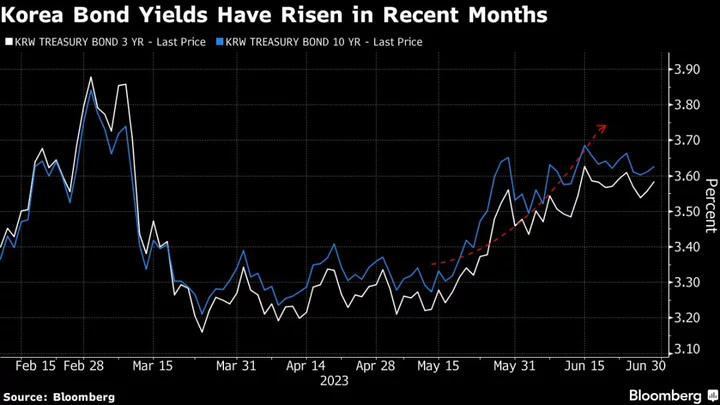South Korean bonds have been the standout pick in Asia for foreign investors this year and their recent decline should be seen as just another window to buy, according to market watchers.
Yields have risen for three straight months as authorities warned about the potential impact of sticky inflation on interest rates. However, data this week are forecast to show consumer prices eased in June for a fifth month, building the case for the Bank of Korea to soften its stance at its mid-July review.
“It’s a good opportunity,” to buy South Korean bonds said Kong Dongrak, fixed-income strategist at Daeshin Securities Co. in Seoul. Rate cut expectations are likely to form soon after the BOK clearly ends its policy tightening cycle, and the current consensus is that it’s almost over, Kong said.
The yield on the nation’s three-year bond has risen about 40 basis points in the last quarter and the swaps market is pricing in no rate cut in the next six months. However, that could change with data on Tuesday forecast to show consumer price inflation in June eased to 2.8% year-on-year from 3.3% in May.
“Inflation is showing a clear trend of easing, and it’s likely to keep moderating, giving no reason for the BOK to hike,” said Ahn Jae-kyun, a fixed-income analyst at Shinhan Investment Corp. The housing market isn’t likely to overheat again any time soon too, which backs the case for a rate cut as early as in the first quarter of 2024, Ahn said.
Ahn sees the three-year bond yield falling to as low as 3.25% and the 10-year yield dropping even more to 3.2% in the fourth quarter as markets price in rate cut bets. Daeshin Securities’ Kong sees both three- and 10-year bond yields edging up slightly in July before falling to the low 3% levels in the second half.
The both the three and 10-year bond yields closed at 3.7% on Friday
Global investors have been building positions in Korean debt this year with purchases accelerating in May and June to the tune of more than $23 billion. Year-to-date they have pumped $37 billion into the bonds, the most in Asia, according to data tracked by Bloomberg.
Still, some like Nomura Holdings Inc. have a more cautious view on inflation.
The easing of core consumer price inflation will be a key indicator for rate reductions, and the BOK would only want to cut if it’s fairly sure the won won’t be too volatile, said rates strategist Albert Leung. Core inflation is still at levels more than double the central bank’s 2% target.
But Korean bonds are near the cheapest they’ve gotten recently and yields could ease by 15 basis points through the rest of the year especially in the fourth quarter, Leung said.
Here are the key Asian economic data due this week:
- Monday, July 3: Caixin China manufacturing PMI, Indonesia S&P global manufacturing PMI, Indonesia CPI, India S&P global manufacturing PMI, Thailand S&P global manufacturing PMI, Philippines S&P global manufacturing PMI, Taiwan S&P global manufacturing PMI, Singapore purchasing managers index, Hong Kong retail sales, Jibun Bank Japan manufacturing PMI
- Tuesday, July 4: South Korea CPI
- Wednesday, July 5: Caixin China composite PMI, Caixin China services PMI, South Korea foreign reserves, India S&P global composite PMI, India S&P global services PMI, Thailand CPI, Philippines CPI, Taiwan foreign reserves, Singapore retail sales, Hong Kong S&P global PMI
- Thursday, July 6: Taiwan CPI
- Friday, July 7: South Korea current account balance, Indonesia foreign reserves, Thailand foreign reserves, Philippines unemployment rate, Taiwan trade balance, Singapore foreign reserves

